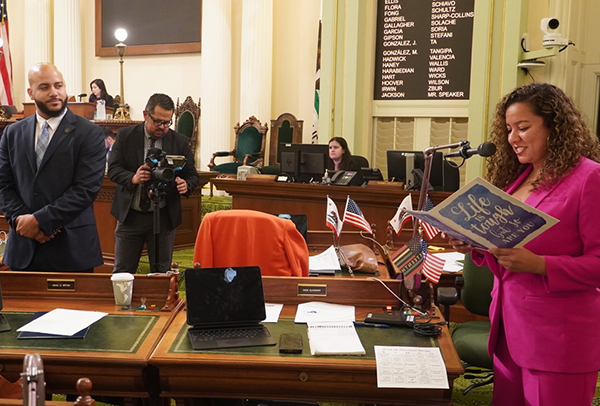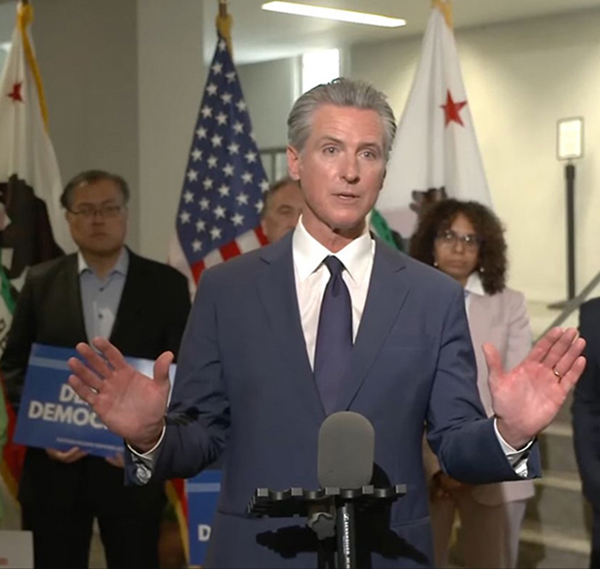Legislature sends five reparations bills to governor

California Legislative Black Caucus members Assemblywoman. Sade Elhawary right, and Assemblyman Issac Bryan on the Assembly floor during proceedings Sept. 11. Both lawmakers have reparative justice bills headed to Gov. Gavin Newsom’s desk.
Photo by Antonio Ray Harvey
By Antonio Ray Harvey
Contributing Writer
SACRAMENTO — The state Legislature has approved five bills that were part of the California Legislative Black Caucus’ “road to repair” legislative package and sent them to Gov. Gavin Newsom. Newsom has until Oct. 12 to sign or veto the bills.
Among the package was Assembly Bill 62, authored by Assemblywoman Tina McKinnor, D-Inglewood, passed in the Assembly by a 66-4 vote Sept. 9. It will provide restitution for victims of racially motivated eminent domain and their descendants.
“I feel so hopeful that the governor will sign it,” McKinnor told California Black Media Sept. 11 at the State Capitol. “Actually, it will help the descendants of chattel slavery at the top, but it helps every Californian whose home or property was taken through eminent domain.”
McKinnor’s bill defines “racially motivated eminent domain” as the acquisition of private property by a state or local government for public use without just compensation, motivated by the owner’s race or ethnicity.
According to AB 62’s language, the California Civil Rights Department, upon appropriation by the Legislature, will be directed to review, investigate and make certain determinations regarding applications from persons who claim they are the dispossessed owners.
Republican Assembly members Carl DeMaio, Stan Ellis, Alexandra Macedo and Heather Hardwick voted against AB 62. A day before its final Assembly floor vote, the bill passed 30-7 in the Senate.
AB 62 builds on the momentum of California’s decision to return Bruce’s Beach in Los Angeles County to its original owners. In September 2021, Gov. Newsom signed Senate Bill 796 into law, granting Los Angeles County the authority to transfer the Bruce’s Beach property back to the descendants of Willa and Charles Bruce, who were unjustly stripped of their beachfront land without consent.
“People must understand, most of the time when homes were taken by eminent domain, it was the poor people’s homes — Black and brown,” McKinnor said. “I think this is a good bill for California and a good way that Californians get paid back for their land. It’s similar to Bruce’s Beach.”
In February, the Legislative Black Caucus introduced its multi-year Road to Repair legislative package based on recommendations included in the state’s 2023 reparations task force report. Other reparation bills on their way to Newsom’s desk, including:
• Assembly Bill 766, authored by Assemblywoman LaShae Sharp-Collins, D-Sam Diego, mandates state agencies to perform a “racial equity analysis” on new regulations and budget requests. It passed out of the Assembly with a 48-14 vote.
• Assembly Bill 742, authored by Assemblywoman Sade Elhawary, D-Los Angeles, requires state licensing boards to expedite applications for individuals who are certified as descendants of American slaves. It cleared the Assembly on a 59-16 vote.
• Senate Bill 437, authored by state Sen. Akilah Weber Pierson, D-San Diego, will require the California State University system to research and develop methods for verifying an individual’s status as a descendant of a person who was enslaved in the United States. The bill would authorize the use of up to $6 million to enable the CSU to conduct the research.
The Senate concurred with Assembly amendments to SB 437 on a 29-10 vote.
• Senate Bill 518, also authored by Weber Pierson, establishes the Bureau for Descendants of American Slavery within the California Department of Justice. The bill aims to address past and ongoing harms caused by slavery and discriminatory policies against Black Californians. It pass the Senate on a 30-10 vote.
Members of the Coalition for a Just and Equitable California, a grassroots reparations organization, have been forcefully fighting against both Weber Pierson’s bills, claiming the measures are “undermining real reparations.”
Chris Lodgson, the lead organizer and advocate for the coalition, said in a statement that SB 437 and SB 518 “divert, delay, and diminish the urgent demand for reparations.” He is asking the governor to veto both bills.
“Reparations delayed are reparations denied,” Lodgson said. “California cannot study, stall or divert its way out of its responsibility.
“Our movement will continue to demand reparations be enacted with respect, safety, and urgency and we will not accept half-measures that undermine that goal.”
Antonio Ray Harvey is a reporter for California Black Media.





